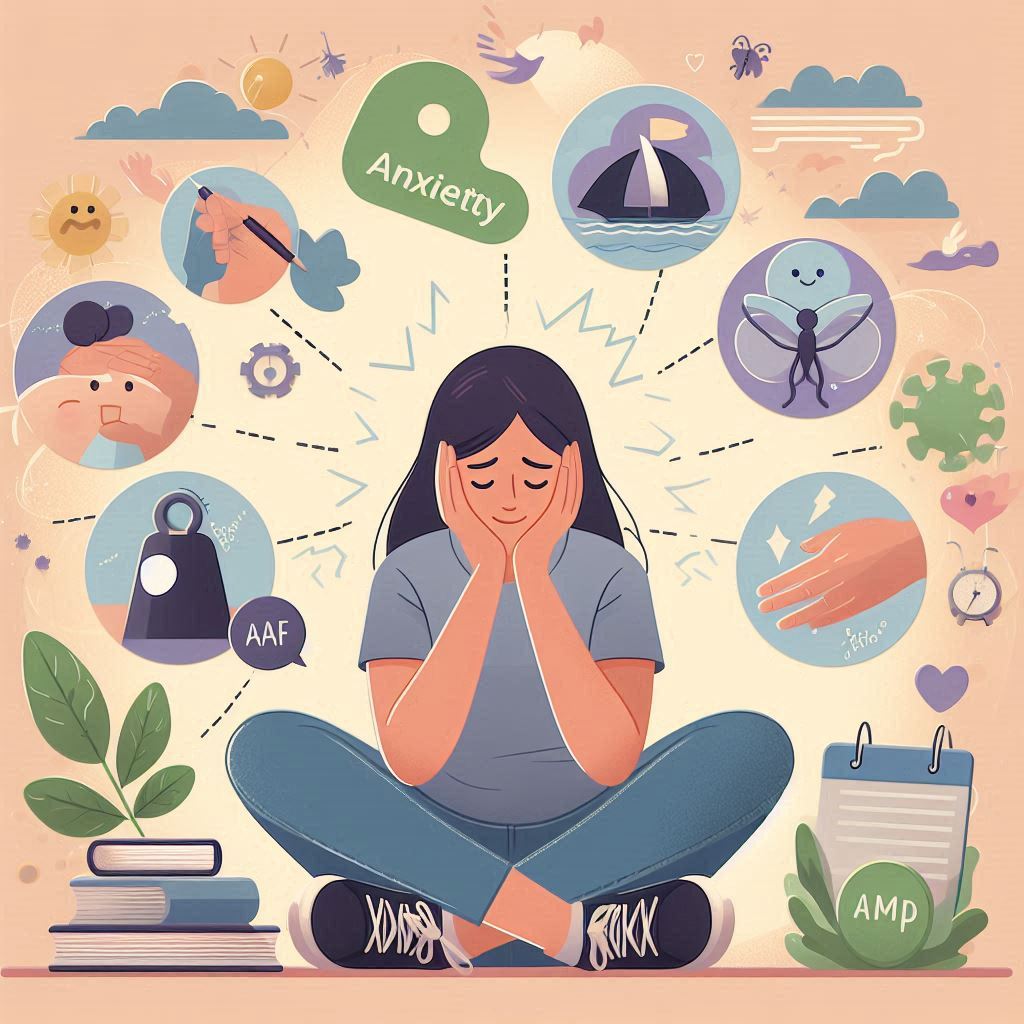Your cart is currently empty!

Understanding Anxiety: Signs, Support, and Strategies for Healing!
Understanding Anxiety: Signs, Support, and Strategies for Healing!

Welcome to our mental health blog! Today, we talk about understanding anxiety—a condition that impacts millions of people worldwide, often without being fully understood. Whether you’re experiencing anxiety yourself or supporting someone close to you, it’s essential to recognize the signs, understand how to manage it, and know when to seek help.
What is Anxiety?
Anxiety is more than just worrying about a test or a presentation; it’s a persistent feeling of unease or fear that can affect daily life. It can manifest as general anxiety, specific phobias, social anxiety, panic attacks, and more. Though everyone experiences anxiety to some degree, for some, it becomes overwhelming and difficult to manage without support.
Anxiety can look different for everyone, and its effects can range from mild discomfort to severe interference with day-to-day functioning. But there is hope, and with the right tools, anxiety can be managed effectively.
Common Signs of Anxiety
Anxiety can present itself in various ways. Common symptoms include:
-
Excessive worry or fear about everyday situations
-
Rapid heartbeat, sweating, or trembling
-
Trouble concentrating or feeling restless
-
Muscle tension, headaches, or digestive issues
-
Avoiding certain situations due to fear of anxiety
-
Difficulty sleeping or feeling exhausted despite a full night’s rest
-
Panic attacks, characterized by sudden intense fear and physical symptoms like chest pain or shortness of breath
If these symptoms feel familiar, it may be time to reach out for support. The earlier you address anxiety, the more manageable it becomes.
How to Get Help
If you’re struggling with anxiety, reaching out for professional help is an important first step. Therapy, such as Cognitive Behavioral Therapy (CBT), has been shown to be highly effective in treating anxiety disorders. Additionally, medication prescribed by a healthcare provider can help manage symptoms.
If you live in Florida, Ellipsis Counseling Center, offers individual virtual sessions for adults to address anxiety, stress, and other mental health concerns. Our goal is to create a supportive space where you can work through your anxiety with the guidance of a professional.
Other resources include:
- National Institute of Mental Health (NIMH): Offers valuable resources and treatment options
- Anxiety and Depression Association of America (ADAA): Provides information, online therapy directories, and support groups
- Therapy directories like Psychology Today: Helps you find a therapist who specializes in anxiety
Coping With Anxiety
Managing anxiety often requires a combination of professional treatment and self-help strategies. Here are some tips to help you cope with anxiety:
-
Practice mindfulness – Mindfulness techniques like deep breathing and meditation can help you stay present and reduce anxiety.
-
Exercise regularly – Physical activity can lower stress hormones and boost mood.
-
Limit caffeine and alcohol – These substances can increase anxiety symptoms.
-
Get adequate sleep – Poor sleep can heighten anxiety, so try to establish a relaxing bedtime routine.
-
Challenge negative thoughts – Learn to identify and reframe unhelpful thoughts with a therapist’s guidance.
-
Stay connected – Talk to friends, family, or support groups when you’re feeling anxious. It helps to know you’re not alone.
Living With Someone Who Has Anxiety
Supporting someone who has anxiety can be challenging but immensely valuable. Here are some ways you can help:
-
Listen without judgment – Sometimes, the best support is simply being there to listen.
-
Encourage treatment – Gently suggest therapy or other treatment options, but don’t pressure them.
-
Respect their boundaries – People with anxiety may need space or time to process their feelings. Be patient and understanding.
-
Be calm in their presence – When someone experiences anxiety, your calm demeanor can help them feel safer and more supported.
-
Learn more about anxiety – Educating yourself about anxiety will help you better understand what they’re going through and how to support them.
Support Groups and Community Resources
Joining a support group can help individuals with anxiety feel less isolated and more understood. Some helpful options include:
-
Anxiety and Depression Association of America (ADAA) – Offers online and in-person support groups
-
NAMI (National Alliance on Mental Illness) – Provides peer-led support groups for both individuals and families
-
Mental Health America (MHA) – Offers community-based support and educational resources
-
Therapy and self-help groups – Local therapy centers or online platforms often offer group sessions focused on anxiety
Support groups can be a lifeline for individuals struggling with anxiety, providing a sense of community and shared experience.
Takeaway:
If you or someone you know is facing mental health challenges, taking the first step toward treatment can make a profound difference. Early intervention, professional help, and community support are all tools that can lead to recovery and peace of mind. If you are ready to take that step, consider reaching out to professionals who can guide you through your journey. Whether through Ellipsis Counseling Center or another resource, help is always within reach.
Thank you for joining us on this journey to promote mental well-being and breaking the stigma. Stay tuned for more insights, tips, and stories on our mental health blog, and don’t forget to check out our Podcast and YouTube channel for deeper discussions and additional resources!
If you have a personal journey related to this topic that you would like to share, please feel free to email us at [email protected]. Let us know if you want to share it anonymously or with your name.
